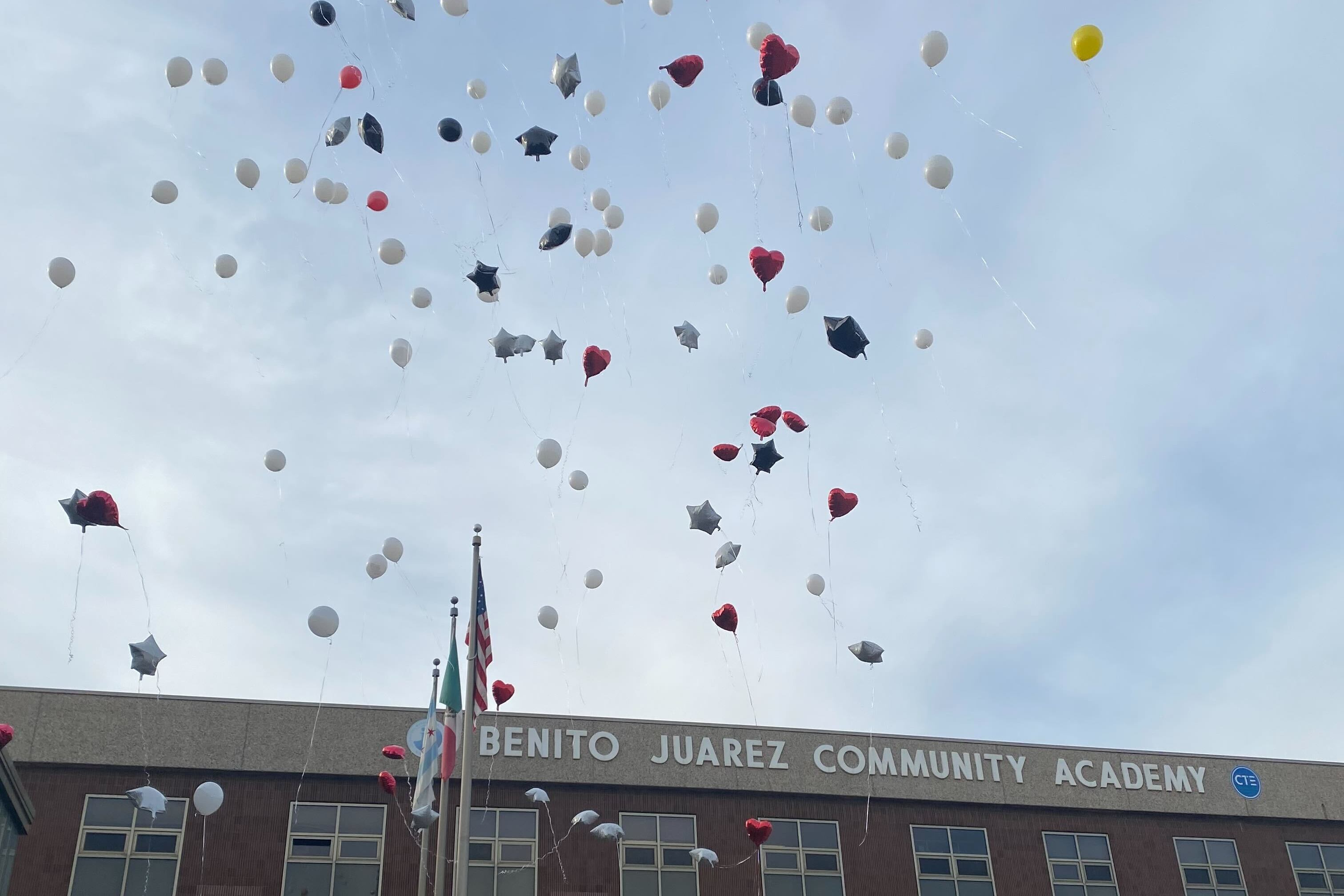Chicago Public Schools sent crisis teams to Benito Juarez Community Academy High School Monday to provide grief counseling after a shooting outside the school Friday left two students dead and two hospitalized.
District officials said they are offering an adjusted schedule — with an early release each day this week — to give students and staff time to process what happened and get help. In a letter sent to families Saturday, Juarez Principal Juan Carlos Ocon said the school would provide “counseling, healing circles, and other resources designed to help students and staff to process and begin the healing process.”
Outside the Pilsen high school on Monday, additional security and police were present. In the afternoon, students gathered to release white, red, and black balloons to honor their classmates.
The trauma of gun violence is all too common in Chicago and can ripple through other school communities. In this case, the four victims attended three different schools — Juarez, Chicago Bulls College Prep, and UIC College Prep. Chicago Bulls College Prep and UIC College Prep are both campuses of the Noble Network of Charter Schools.
Chalkbeat has put together a list of resources where parents, students, and school staff can find mental health support and heal from the trauma surrounding this incident and broader gun violence in Chicago.
How to support the victims and their families
Both families of the boys who were killed have launched GoFundMe pages to raise money to support memorial and funeral costs. The Cook County Medical Examiner identified the two victims as 14-year-old Nathan Billegas and 15-year-old Brandon Perez.
A GoFundMe page for Nathan had raised nearly $9,000 as of Monday afternoon. Nathan attended Noble’s Chicago Bulls College Prep, his sister wrote. She described him as a “very intelligent, outgoing, and a kindhearted young boy.”
A GoFundMe page for Brandon had raised more than $10,000 as of Monday afternoon.
According to his family, Brandon attended Juarez and “aspired to become a tradesman in general construction and electricity and hoped to one day become a business owner with multiple trade certificates.” Juarez has seen a revival of its trade programs in recent years.
Help hotlines available to Chicago students
Chicago Public Schools has a crisis hotline for students at 773-553-1792 and a Student Safety Center where people can report an emergency by calling 773-553-3335.
Numerous national helplines also help youth connect with crisis counselors 24/7. The National Youth Crisis Hotline is at 1-800-448-3000. Students can also text HOME to 741741.
The school district also lists the following numbers on its website for students to use to get help:
- The National Alliance on Mental Illness (NAMI) Chicago: 1-833-626-4244
- The Substance Abuse and Mental Health Services Administration: 1-800-662-4357
- The Trevor Project (LGBTQ+ Support): 1-866-488-7386
- The National Domestic Violence Hotline: 1-800-799-7233
Students can now take mental health days
All students are allowed to take up to five mental health days under a new Illinois law. A medical note is not required and the absence is considered excused, according to district policy.
That policy — adopted earlier this year in March — requires all schools to have a team of people to address student mental health. According to the district’s staffing data, Juarez has seven school counselors and two school social workers for more than 1,500 students. That’s up from 2019, when there were six and one, respectively.
Juarez also has a school-based health center run by Alivio Medical Center that offers some behavioral health services. A district spokesperson said telehealth is also available through Alivio and other community partners to all Juarez students who may be staying home this week to process Friday’s events.
Dozens of other schools have similar health centers to provide medical and other health services to students, families, and, in some cases, the broader community.
How to talk to young people in the wake of trauma
It can be difficult to know what to say to a child or teen after a shooting. The National Association of School Psychologists has helpful guidance for how to talk with children about gun violence. They say it’s important to take time to talk and listen and keep an eye on how a child is responding — looking out for unusual behaviors such as loss of appetite or disrupted sleep patterns.
The organization also says it’s important to keep conversations age-appropriate and reassure children they are safe. Listening to and allowing young people to ask questions can be powerful too. If your child does not want to talk, being present is enough. Be open to other forms of expression, such as music and art, as well.
Limit media consumption and unplug
There can be a barrage of news and a rush of information and activism in the wake of a shooting. But it’s also important to unplug and limit media consumption to reduce anxiety and confusion, according to the National Association of School Psychologists. The National Child Traumatic Stress Network also recommends parents and other guardians take time to rest and encourage their children to do the same.
Look up Chicago Public Schools’ safety plans
Until two years ago, most Chicago high schools had police officers stationed inside. In 2020, local school councils began voting to remove the officers in favor of alternative approaches to discipline and safety. Juarez was one of the schools that removed school-based officers.
Now, several schools have something called a Whole School Safety Plan that replaces police with alternative support staff, such as climate and culture coordinators, restorative justice coordinators, social workers, and security guards. Not all schools have them, but you can search if yours does here.
Chicago Public Schools also operates a program to help students walk to and from school safely. Many schools have these Safe Passage routes, which place trained adults in yellow vests along routes around a school during arrival and dismissal. You can look up whether your school has a route here.
City money available to families of gun violence victims
On Monday morning, Mayor Lori Lightfoot and the city’s health department announced nearly $275,000 emergency fund for families who have lost loved ones to gun violence.
Under the pilot program, victims with physical injuries can get $1,000 in financial assistance, families can get $1,500 to help offset funeral and burial costs, and families can also get $1,000 in relocation costs.
A press release from the mayor’s office said those funds will be distributed through four community organizations: Centers for New Horizons, Breakthrough Urban Ministries, Institute for Nonviolence Chicago, and Universal Family Connection, Inc. A city spokesperson said the money is only available to victims of gun violence living in West Garfield Park, East Garfield Park, Englewood, West Englewood, and New City on or after October 1, 2022.
Samantha Smylie contributed reporting.
Becky Vevea is the bureau chief for Chalkbeat Chicago. Contact Becky at bvevea@chalkbeat.org.





